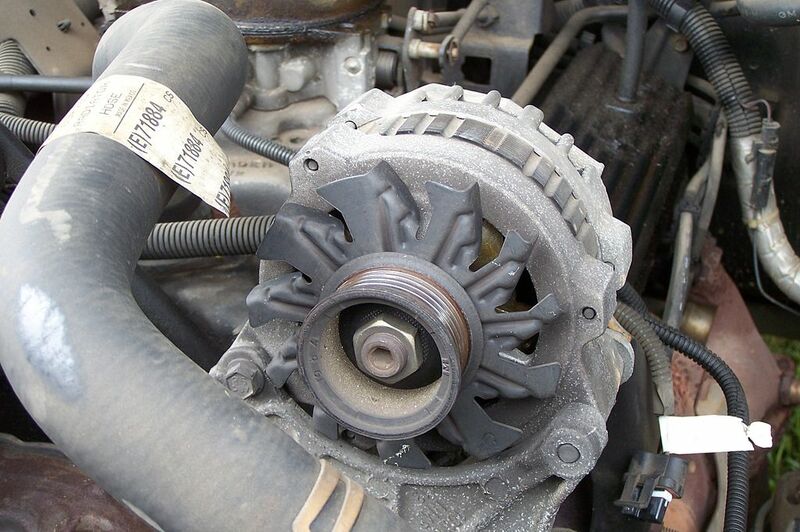Rain and deep puddles are nothing but deep water will make you learn how to fix a water damaged alternator. With that in view, let’s do a deep dive (pun intended) into how water interacts with your alternator.

What Is A Car Alternator?
Consider how much electricity your vehicle consumes. The majority of us take our headlights, dash lights, charging ports, and other amenities for granted, not to mention the engine starting.
While it’s tempting to think the battery is supplying this power and move on, this isn’t totally accurate. While automotive batteries have a far larger capacity than your iPhone, they still need to be charged, which the alternator performs.
A rotating pulley in your alternator converts mechanical energy into potential energy stored in your battery. This energy ensures that your battery is always charged and can start your car, as well as run your navigation, heater, stereo, and other devices.
Given that your alternator is essentially your car’s generator, it’s understandable that you don’t want it to get wet. Your alternator, on the other hand, is unaffected by water (in most cases).
Are Car Alternators Waterproof?
Alternators in automobiles are not waterproof. It’s nearly hard to waterproof an alternator because of the way it’s manufactured. The majority of alternators are air-cooled, with air pushed through the alternator by an internal fan attached to the drive end of the shaft.
Cool air is drawn in from the non-drive end, while heated air is pushed out from the driving end.
However, just because your alternator isn’t waterproof doesn’t imply it can’t withstand water. An enclosure must be graded between IP 65 and IP 68 to be called “waterproof.”
What Are The Problems You Will Deal With A Water Damaged Alternator?
Your alternator is frequently exposed to water in the engine bay of many autos. This includes water from the rain, puddles, and physically washing the engine bay.
Your engine compartment isn’t completely sealed. It is constantly splashed with water.
It will work if you immerse the alternator.
Your alternator’s electronic parts are enclosed. Your alternator’s brass or bronze brushes are oiled to reduce wear and electrical arcing.
This lubricant goes away as they get wet. The electrical arc damages the brushes, causing them to wear out.
These brushes can rust if they are exposed to water repeatedly, causing them to lose touch with the slip rings.
With a damaged alternator, you’ll also have to deal with filth. Particles like sand and dirt can seep into the brushes and freeze them out of touch with your slip rings if your automobile is drenched in water.
Can You Polish An Alternator With Water?
If you don’t want to pressure wash your alternator, you can cleanse it using water. Pressure washing your engine bay can harm your seals, which we don’t want since, as we’ll see in a minute, that’s not what you want to do.
When it comes to washing your alternator, water is preferred over petroleum-based engine degreasers.
Here are the things you can do:
- To avoid being shocked, remove the battery.
- Fill a bucket halfway with warm water and a drop of dawn dish soap. A small amount should be added to the water.
- Pour or spray the water-soap mixture on the alternator terminals and brushes carefully.
- Allow 5 minutes for the soap to work its magic.
- Use a wire brush to gently scrape the filthy spots.
- Let the alternator dry after a deep clean with clean water.
Fixing A Water Damaged Alternator
Step #1. Pour a can of CRC electronic cleaner or a comparable solution into the alternator and leave it to sit for 24 hours. After that, your alternator should be OK.
Step #2. Leaving the hood open to allow circulation into the engine bay can also assist to dry it off.
What You Should Do If Alternator Is Still Not Charging?
This usually occurs when someone cleans the engine bay while the engine is running. When you utilize a power washer, you run the risk of damaging your alternator.
Your alternator is toast if you scrubbed your engine bay with the engine running. If that’s the case, your best option is to simply replace it.
There is still hope if you power washed it. With a can of CRC electric clean, follow the above directions and let it sit for 24 hours.
If the problem persists, the alternator will very certainly need to be replaced.
A Few Pro-Tips
The alternator, like most other automobile components, can fail at any time due to a variety of factors. Old age is one of the most common causes of alternator failure.
Fluid leaks, broken drive belts, defective rectifier diodes, and improper wiring are some more problems that might impact the operation of your alternator.
To take better care of your car from other forms of damages, browse through this article on how to clean a car with a pressure washer and how to get rid of mildew on exterior of car.
Conclusion
To get your car out of that watery fate, a saved article on how to fix a water damaged alternator could play to your advantage. So, the next time you are facing the same situation, you are definitely not stuck!
